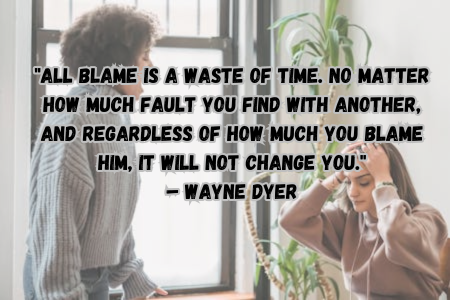Blame is as old as time. When things go wrong, our instinct often drives us to find someone to hold responsible. But what if the blame game does more harm than good? What if it further entangles us in a web of conflict instead of resolving the issue? In a world where communication is vital to every relationship, understanding how Blame works and how we communicate can be the difference between mending fences and burning bridges.
The Psychological Reasons Behind Blaming Others
We often blame others to safeguard our self-esteem, sidestep shame, and escape guilt. It’s simpler to accuse than to look within ourselves. This tendency stems from psychological defense mechanisms, such as projection, where we assign our shortcomings to others. Blame acts as a barrier to communication. It breeds resentment, defensiveness, and a breakdown of trust. When blaming becomes a routine, it can undermine the very foundation of any personal or professional relationship.

The Power of Words: Communication Can Escalate or Resolve Conflict
Communication is a powerful tool. The words we choose can either soothe a situation or ignite it. When we blame others, we often resort to critical language, which puts the other person on the defensive. However, selecting the right words can foster and lead to resolution.
- Miscommunication: A Common Culprit in the Blame Game
Uncertainty can lead to miscommunications that escalate into blame. Whether it’s a misinterpreted tone, a text message read incorrectly, or an assumption made without clarification, these factors can spark conflict.
- The Key to Preventing Blame
- listening involves concentrating on the message being conveyed rather than merely hearing the words. It helps in grasping another’s perspective and avoids the snap judgments that often lead to blame.
3-Who Do We Blame? A Deeper Look
- Self-blaming
- Self-blame can be just as damaging as blaming others. It often leads to feelings of despair and worthless. When we constantly hold our responsible for everything that happens, it can take a toll on our mental well-being.
- Shifting blame to others allows us to avoid responsibility. It’s easier to point fingers than to recognize our part in a situation. However, this disposal can stifle our personal growth and harm our relationships.
- The Effects of Societal and Cultural Standards on Blame
- Social norms and cultural expectations can shape who we blame. In some cultures, questioning authority is uncommon, while in others, the individual is valued, leading to a distinct dynamic of blame.
4-Consequences of Blaming in Relationships
The Cycle of Resentment: How Blame Leads to Long-Term Conflict
discontent and blame create an unhealthy cycle that can lead to ongoing conflict, forming a negative feedback loop. When one person blames another for perceived mistakes, it often triggers feelings of defense and anger. These emotions can prompt the blamed party to react, escalating the situation further. Over time, unresolved issues and persistent blame can foster deep-rooted anger, making it challenging for both parties to engage constructively or find common ground. This cycle can persist for years, eroding trust and damaging relationships, ultimately resulting in a prolonged conflict that becomes increasingly difficult to resolve.
Must Read
- The Power Of Walking Away From Toxic Relationships
- How to Develop Transparency in a Relationship & Its Barriers
- How to Be a Submissive Husband – Benefits & Challenges
Emotional Toll: The Stress and Anxiety Caused by Blame
When people are frequently blamed for problems, whether it’s fair or not, they can start to feel guilty, ashamed, and inadequate. This ongoing pressure can lead to increased stress, as they might constantly worry about being accused again or feel like they are always to blame. Over time, this stress can develop into anxiety, causing the person who is blamed to become overly cautious or even withdrawn to avoid more criticism. The emotional weight of being blamed not only impacts mental health but can also put tension in relationships, making it difficult to keep communication healthy and open.

Breaking the Cycle of Blame
Acknowledging Mistakes and Accepting Responsibility for Action Taken
Admitting errors demonstrates humility and integrity, creating trust and respect from others. Admitting one’s errors also allows for open communication that opens up opportunities to learn, apologize, and make amends. Owning up to mistakes strengthens character while encouraging accountability within an open culture where everyone feels safe sharing experiences.
Engaging in Empathy Training: Understanding Others’ Perspectives
Empathy is essential to creating meaningful connections and creating a supportive environment. By taking time to understand others’ viewpoints, we gain insight into their emotions, thoughts, and experiences, helping bridge communication gaps more easily while decreasing misunderstandings and resolving conflicts more swiftly.
Conclusion
Blame can be an understandable reaction to conflict, yet it is rarely productive. By understanding its dynamics and using effective communication strategies to break its cycle, and foster healthier relationships. Remember: it isn’t about who’s at fault but how we can move forward together.